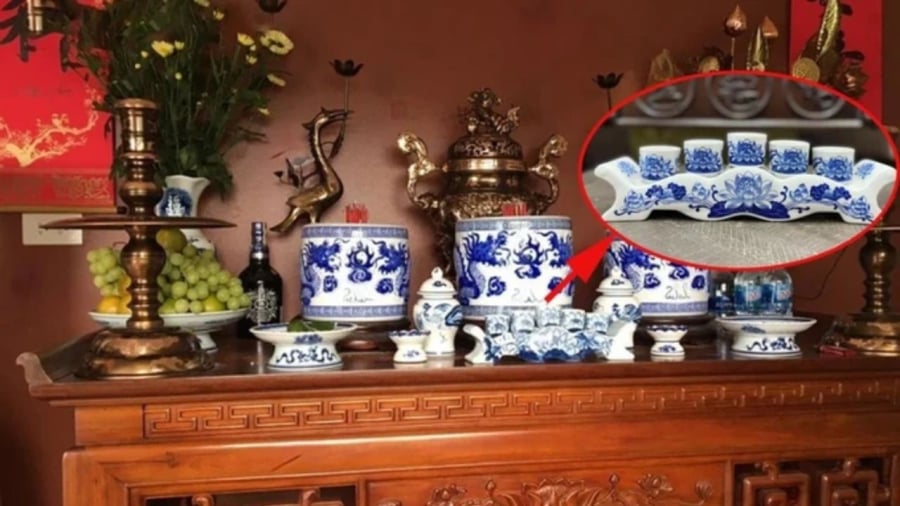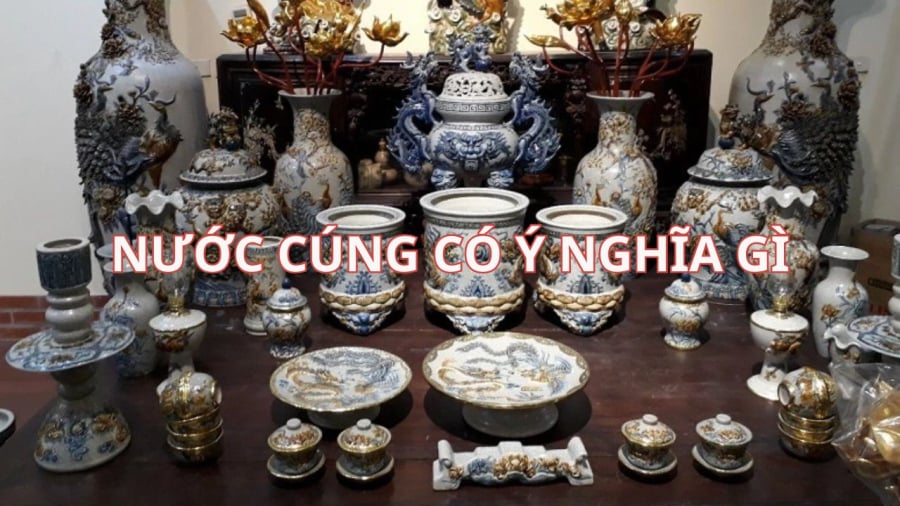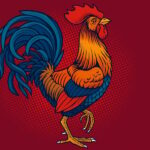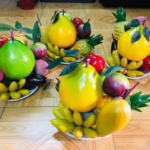In Vietnamese culture, beverages play a significant role in social interactions and etiquette. This is also evident in religious practices, where water is considered essential during rituals and offerings. Whether it’s paying homage to Buddha, ancestors, or the God of Wealth, water is a common element, often presented in a ceremonial cup or bowl.
1. What is the significance of offering water during worship?
Water has long been regarded as a symbol of purity and the source of life. In spiritual contexts, it represents spiritual purity and is believed to be a conduit for positive energy in Feng Shui, attracting wealth and luck.
- In Buddhist worship, water is more than just an offering; it symbolizes the purity of the soul. It encourages followers to lead a life free from greed, anger, and delusion, regardless of their social status. Offering water becomes a moment of self-reflection for Buddhists.
- For ancestor worship, water represents the belief that the afterlife mirrors the living world. It is offered as sustenance for the deceased.
- When worshiping the God of Wealth, water serves to attract prosperity and maintain positive energy for the household.

2. What type of water should be used for offerings?
A common question arises regarding the suitability of tap water, boiled water, or alternatives like alcohol, tea, coffee, or soft drinks for offerings. The answer varies depending on the type of altar.
Buddhist Altar: Prioritizing Purity with Clear Water
For a Buddhist altar, the emphasis is on maintaining a pure and clean environment:
- Opt for clean tap water or bottled mineral water. Avoid colored or sweetened beverages like tea and soft drinks.
- While boiled water or bottled water is acceptable, some prefer tap water as it symbolizes a return to nature and purity.
- There is no need to offer multiple cups; one or three cups are sufficient to represent the Triple Gem: Buddha, Dharma, and Sangha.

Ancestral Altar: Reflecting the Living World
On ancestral altars, water symbolizes the connection between the living and the deceased:
- Clean tap water, filtered water, or boiled water are all suitable offerings.
- During special occasions or death anniversaries, families may offer the favorite beverage of the deceased, such as tea, alcohol, or soft drinks.
- Following the folk belief that “ghosts drink plain water,” many continue the tradition of offering tap water as a sign of respect and sincerity.
Wealth God Altar: Attracting Wealth and Prosperity
Altars dedicated to the Wealth God are meant to invite financial abundance and smooth business endeavors:
- Typically, a set of three or five cups of clean water is placed on the altar.
- Additionally, a bowl of water with floating flowers or a glass of tap water can be included to symbolize purity and positive energy.
- On special days, such as the God’s birthday or during full moon and new moon ceremonies, some offer a cup of white wine or tea as a token of gratitude.
3. How to Offer Water Correctly According to Customs and Feng Shui
The number of cups on an altar usually varies between three and five, depending on the altar’s size and the family’s beliefs:
- Three cups of water: Representing sincerity toward ancestors or the Triple Gem (in Buddhist altars), as well as the three realms and three generations.
- Five cups of water: Symbolizing the five elements of Feng Shui—metal, wood, water, fire, and earth—bringing harmony and completeness to the ceremony.
- For smaller altars, a set of three cups is acceptable to maintain a neat arrangement without violating any taboos.
- Preferably, use ceramic or glass cups instead of plastic or metal ones for water offerings.
When offering water, keep the following in mind:
- Ensure the water is clean and clear, free from any debris or strange odors.
- Change the water daily if it is kept regularly, especially in the early morning, before burning incense.
- Avoid overfilling the cups to prevent spillage, which may disrupt the altar’s aesthetics and negatively impact Feng Shui.
- Always offer water with sincerity and devotion, avoiding a casual or perfunctory attitude.
While the act of offering water may seem simple, it carries profound spiritual significance. Depending on the type of altar, the choice of water—be it tap water for purity, filtered water for cleanliness, or tea/alcohol to honor the memory of loved ones—communicates specific intentions. Ultimately, regardless of the water chosen, it is the sincerity and goodwill behind the offering that matter most.
Reference for further exploration
The Older, the Luckier: 3 Household Items to Hold Onto for Good Fortune
In the realm of Feng Shui, embracing the old can bring forth newfound luck and prosperity. Uncover the hidden treasures within your home—those time-honored possessions that hold more value than meets the eye. Discover the trio of treasures that, when embraced in their aged glory, can attract abundance and blessings your way.
The Ancient Wisdom: Three Things in Your Home That Need Alignment for Abundance and Harmony
“A harmonious and balanced home is essential for a peaceful family life. Sometimes, we may overlook certain aspects of our household that can indicate an imbalance. It is crucial to pay attention to these subtle signs and make adjustments to prevent any unfortunate events from occurring. Keep a watchful eye and take action to ensure your family’s well-being and happiness.”
A Fortune-Flipping Opportunity: 3 Zodiac Signs Blessed with Luck from May Onwards, an Early Investment Could Pay Off Big Time
From the 5th lunar month onwards, these three zodiac signs will experience a notable boost in their financial and real estate luck. With both monetary and land fortunes converging, it’s an opportune time to consider investing in homeland real estate – a means to accumulate wealth and secure your future.


































